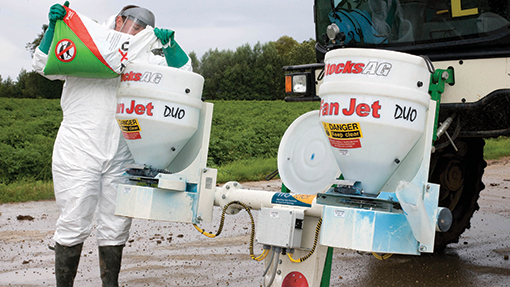Spud growers to be hit hard by slug pellet ban

Potato growers are set to be the hardest hit by the European Union ban on methiocarb slug pellets, which account for about half the slug control market for spuds.
Sales of these poison-bait pellets, such as Draza forte and Decoy Wetex, are set to be banned by the end of August this year due to the risk to grain-eating farm birds.
The withdrawal will limit growers to two products – metaldehyde and ferric phosphate – and will leave crops more susceptible to slug damage.
Independent potato specialist John Sarup uses methiocarb as his number one product against slugs and says the ban is a major setback to the potato sector.
See also: EU votes to ban methiocarb slug pellets
“When you look at the variety portfolio, Maris Piper is still head and shoulders above everything else in terms of the planted area and it is one of the most susceptible varieties we have, which makes the ban even more worrying,” he says.
“I always preferred methiocarb products because I think they are more stable in wetter conditions and give the greatest reduction in tuber hollowing,” he adds.
Mr Sarup advises growers to make the most of the product for this season. In what could be high-risk season after a mild winter, the key timing for potato growers will be just prior to canopy closure, according to Mr Sarup, enabling growers to get bait on the floor by the time the canopy closes.
Simon McMunn, commercial manager at De Sangosse, one of the major producers of metaldehyde slug pellets, admits losing methiocarb is a setback and has increased the pressure on other products.
“The worst thing is to lose any active out of UK agriculture, and certainly in slug control when we only have three actives in the marketplace,” he says.
Mr McMunn says potato growers will be badly hit by the ban and they will need to be careful to adhere any guidelines if they choose to use metaldehyde instead of methiocarb.
“Growers are only able to put 700g active/ha of metaldehyde on a year, irrelevant of the crop,” he says.
“So if you were going to make two applications on potatoes, you could eat into a substantial amount of your permissible metaldehyde allowance,” Mr McMunn adds.
Slug control is set to get more difficult with tighter controls over metaldehyde-based slug pellets likely in high-risk water catchment areas, which will leave ferric phosphate pellets as the only alternative.
Certis is the UK’s sole producer of ferric phosphate and believes it can help take up some of the slack left by methiocarb.
UK marketing and business development manager Robert Lidstone says the product offers a good environmental profile and a competitive price.
“Sluxx [ferric phosphate] is a fully wet extruded pasta formulation, which has performed well in trials on a variety of crops including potatoes,” he says.
Bayer CropScience, the only global supplier of methiocarb, says sales will probably be permitted until the end of August 2014, with growers having until the end of August 2015 to use up stocks.

